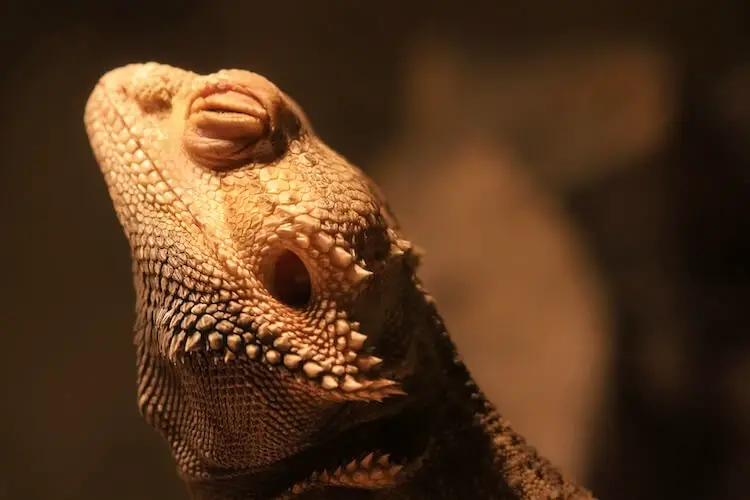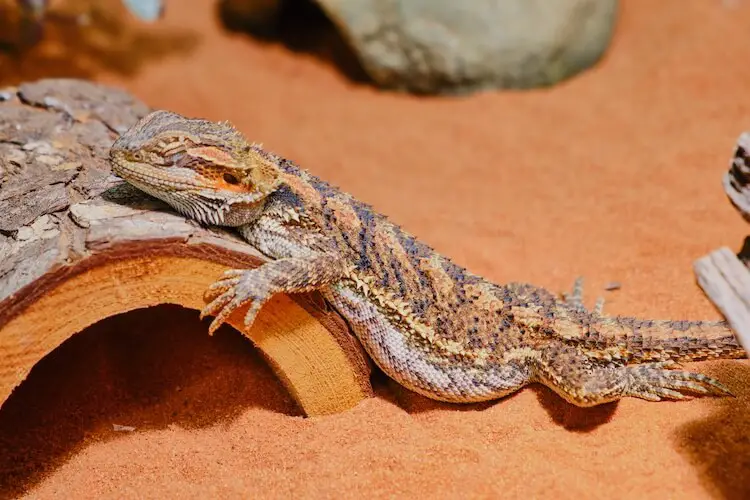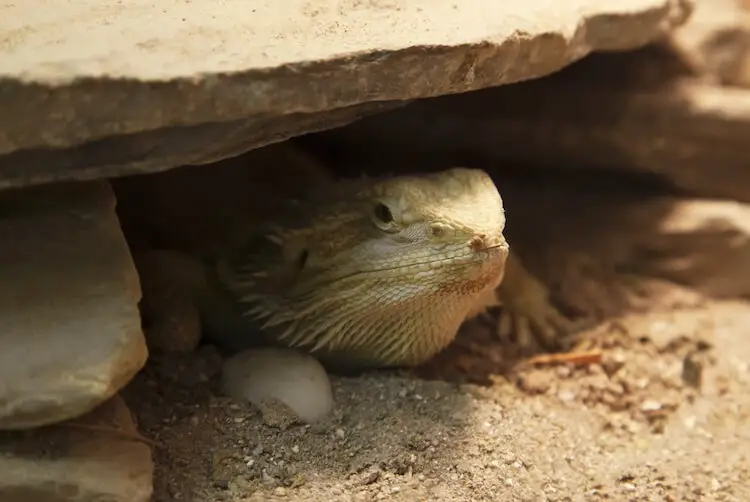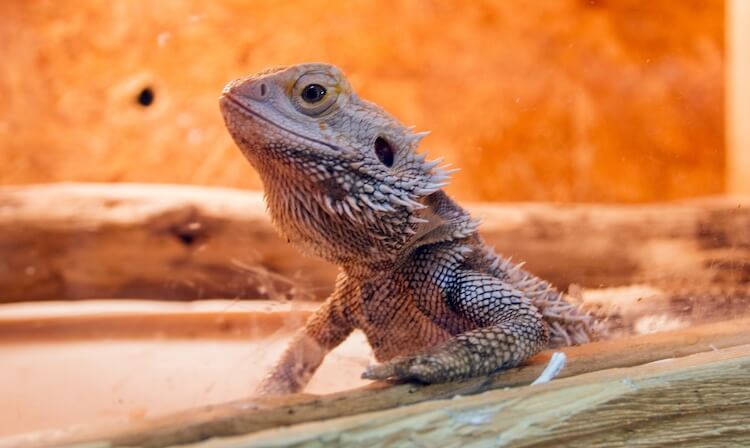How to Wake Up a Bearded Dragon From Brumation

Bearded Dragons are one of the most common pet lizards for first time owners. One of the reasons Beardies are so popular is because they are easy to care for.
Yet, every year Beardies go through a process called brumation. Many owners find brumation confusing and do not know how to care for their dragon during this time.
Brumation is an important aspect of any Bearded Dragon's life. It is a natural behavior that affects both pet and wild species. Owners often do not know much about brumation and ask if this behavior can be sped up, or even prevented.
In this article, we explain what Bearded Dragon brumation is. We also share important signs to watch for, so that any keeper will know exactly what to do and what not to do when their dragon brumates.
Table of Contents
- What Is Bearded Dragon Brumation?
- Symptoms and Common Signs
- Bearded Dragon Brumation Age
- How Long Does It Last?
- What To Do
- What Happens After Your Bearded Dragon Wakes?
- How To Wake Up A Bearded Dragon from Brumation
- Is A Bearded Dragon Dead, Sick or Brumating?
- Summary
What Is Bearded Dragon Brumation?

Brumation is a period of dormancy that bearded dragons use to survive during the colder months in Australia. Bearded Dragons normally brumate during the Southern Hemisphere's winter in June, July and August. Animals normally build a burrow and go into a deep sleep until the temperature rises again.
It is a process very similar to hibernation that many species of reptiles go through.
Brumation and hibernation are terms often used interchangeably, as they mean the same thing. Although brumation is associated with cold-blooded animals (e.g. reptiles) and hibernation is linked with warm-blooded animals (e.g. mammals).
For this reason, your Bearded Dragon will brumate, but will not hibernate.
Bearded dragons brumate because they cannot internally regulate their body temperature. Instead, they must use external sources to heat or cool their body. This is why you can find Beardies sunning themselves on cold days, or seeking shade and staying out of the sun in the middle of a hot day.
Many animals can survive low temperatures over a short period of time (i.e. a day or two), but when the temperature is too low for too long, survival becomes difficult, especially for cold-blooded animals.
Brumating allows bearded dragons to survive cold winters which they normally would not be able to.
Before a Bearded Dragon starts to brumate, they will eat lots of food to build up nutritional reserves. They will then live off this excess when they go into brumation.
The main difference between hibernation and brumation is how easily an animal wakes up from their deep sleep. Mammals that hibernate are difficult to wake up, reptiles in brumation are not.
If a brumating dragon's internal temperature rises they will wake up, even if winter has not finished. This means that some bearded dragons can leave their dens during the winter if the temperature is sufficiently warm.
Keep this in mind when watching your Beardie. It is likely they will not go into a deep sleep for several months at a time. Instead they will become less active, less hungry, and sleep more. They can be brumating, but not sleeping the entire time.
Symptoms and Common Signs
There are some clear, and some not so obvious, ways to tell if your Bearded Dragon is brumating. Your Beardie can show signs of brumation at any time, but they typically show the following signs when their tank's temperature is decreased:
- Eating less.
- Sleeping more.
- Spending more time in a hide.
- Staying out of the basking spot.
- Staying out of direct light.
- Moving slower than normal.
During brumation, your Bearded Dragon will be sleeping much more than normal. This helps them to reduce the amount of energy they spend. Instead of being awake during daylight hours, they will spend most of their time asleep in a hide.
The increased time spent sleeping it also accompanied by a decrease in activity. Even if your dragon is awake, they will be less active during brumation.
Another common sign is a decreased appetite.
Bearded Dragons use their fat reserves to survive brumation. Because of this, they do not need to eat as much as usual. This lack of eating will subsequently be followed by a lack of poop.
Many signs of brumation can also be signs of health issues. You will need to keep a close eye on your Beardie during this time.
A healthy adult will weigh between 300 to 500 grams. They should not lose more than 50 grams of body weight during brumation. If they are losing a large amount of weight, or if they begin to look thin and malnourished, then check for parasites or major health problems.
Bearded Dragon Brumation Age
You may be thinking, "How old will my Beardie be when they first brumate?"
Unfortunately, that question cannot be answered with any certainty. Many bearded dragons will first brumate between 10 to 24 months of age.
But, every Bearded Dragon is different.
Some brumate earlier than others, and some may not brumate until three years old – if at all. There is no way to predict whether or not your Beardie will brumate. They may do it once a year, once every other year, or not at all.
One thing that can be answered for certain is young Bearded Dragons (under nine months) should not brumate at all.
It is normally better to keep Beardies awake during their first winter by increasing basking temperatures to around 105°F.
When Beardies brumate they greatly reduce the amount of food they eat. In younger species, or individuals that are not a healthy weight for their age, this can be unhealthy and dangerous. They may not have enough reserves to stop eating and survive for a few months.
How Long Does It Last?
Brumation is a period of dormancy based on seasonal cycles. It will normally last as long as the Australian winter does. In most cases Bearded Dragon brumation lasts for one to three months. You should expect them to sleep anytime from early June until September.
If they do not brumate according to Australia's seasonal patterns, they will likely brumate according to their tank or personal conditions.
For several months expect your Beardie to be sleeping and rarely coming out for water.
Brumation is not a fast process. Bearded Dragons do not go partly into brumation, this is a common myth. They either are, or are not brumating.
What To Do

Caring for a Bearded Dragon during brumation is hands-off for the most part. But there are still some things you can do to provide the best environment for your pet.
If you notice your bearded dragon slowing down, avoiding their basking spot, and spending more time in their hide (for a week or more) they may be starting to brumate.
The first step is to turn off all enclosure lighting and heating.
One week after you stop feeding them, gradually reduce their lighting and heating from 14 hours each day until it is completely off. This helps to replicate the natural conditions in which they normally brumate.
Do not worry about their tank becoming too cold. Remember, brumation involves sleeping through the cold weather. Turning off your lizard's heat and light source will not cause any problems.
Next on your to-do list is water. There should be no change to this aspect of care.
Make sure that your beardie has access to clean, fresh water. It should always be available, whether or not they drink it.
If you notice your Beardie is out of its hide during brumation, you can offer him some food. Most will normally refuse food, so do not be surprised if this happens. However, some will be hungry and may want to eat. If they do eat, turn on the lights and heater for the day to help them digest it.
Finally, you will need to keep their enclosure clean. Because your Beardie will not be eating very often, keeping the enclosure clean during brumation is much easier.
Bathing your Bearded Dragon during brumation is a common myth. You do not need to do this. Wild species are not bathed and pet species should not be either. As long as you provide fresh water they will not become dehydrated.
Brumation is a daunting process for first time keepers. If you follow the basic rules above your Beardie will brumate in a safe and healthy environment.
What Happens After Your Bearded Dragon Wakes?
This is the easy part, everything should go back to normal.
Once they wake up, they will be ready to act as if nothing happened, and so should you. When you see them come out of their hide, get them back on their usual feeding, heating and lighting schedule.
If your Bearded Dragon was a healthy weight, they should be almost the same as they were before brumation. If you have followed the brumation tips in this article, there will be no need to monitor your Beardie any more than usual.
How To Wake Up A Bearded Dragon from Brumation

There is not a good reason to wake up a Bearded Dragon brumating. You should always allow your Beardie to wake up naturally. Never try and wake them up by increasing the tank temperature.
Once your dragon has started brumating, there is not very much you can do to stop it.
Instead of trying to wake up your dragon, focus on ways to make the process healthy for them. Turn off the heating and lighting and make sure they have access to a clean water bowl and a dark secure hide.
Bearded Dragons have been brumating in the wild far longer than humans have been caring for them as pets. There is no need for you to get in the way of this process.
The 'best way' to wake up your Beardie is to prevent it from brumating in the first place.
Unless they are sick, under nine months old, or do not have enough body mass to brumate safely, you should not try to stop this process from happening.
Repeatedly waking your lizard in an attempt to stop brumation can actually cause them to brumate for longer.
If you want to try and prevent bearded dragon brumation, then make sure they are not exposed to winter-like conditions in their habitat. As it gets closer to brumation, increase the basking temperature to above 105°F and keep the lighting on for 14 hours a day.
We do not have a great amount of control over whether or not our Beardies goes into brumation.
There is no guarantee that any of the steps above will work. Some individuals will go into a deep sleep regardless of what you do. If this happens, let them sleep.
Is A Bearded Dragon Dead, Sick or Brumating?
Understanding if your Bearded Dragon is sick or brumating can be hard, especially for first time keepers.
Common illnesses such as parasites present very similar symptoms as brumation.
During brumation your bearded dragon will not be eating much food. But, they should not be losing much weight too. Most adults weigh between 300 and 500 grams, they should not lose more than 50 grams during brumation.
If you lizard is losing weight rapidly, and its muscle mass decreases noticeably, then it is more likely to be sickness and not brumation.
You can weigh your Beardie to keep track.
Most adult Bearded Dragons will lose only 5 to 30 grams during brumation.
If your lizard is not eating, slowing down, and spending time in a hide, but also shows signs of a bad shed or damage to their eyes, these are not symptoms associated with brumating.
Once you have a good idea of what brumation is, and have been through some with your Beardie, you will begin to see the difference between signs of brumation or illness.
Summary
Brumation is a period of dormancy similar to hibernation where Bearded Dragons sleep for an extended period of time. This process can last for one to three months and helps them survive the colder seasons when hunting and survival are both difficult.
Your lizard will eat, move, poop, and drink far less during this process. During these few months lighting and heating are not necessary so should be switched off.
Brumation is common in pet species and many breeders encourage it for healthy breeding. It should not be a cause for concern.
Never try to attempt to wake a bearded dragon that is brumating. Instead focus on ways to help the process go as smoothly as possible such as providing fresh water and keeping their tank clean. Increasing the basking spot temperature to 105°F can sometimes prevent brumation, but this should only be done for babies under nine months old or individuals who are underweight.
Do you have experience with brumation in Bearded Dragons, or other species of reptile? Let us know.
How to Wake Up a Bearded Dragon From Brumation
Source: https://www.everythingreptiles.com/bearded-dragon-brumation-explained/#:~:text=There%20is%20not%20a%20good,can%20do%20to%20stop%20it.
0 Response to "How to Wake Up a Bearded Dragon From Brumation"
Post a Comment